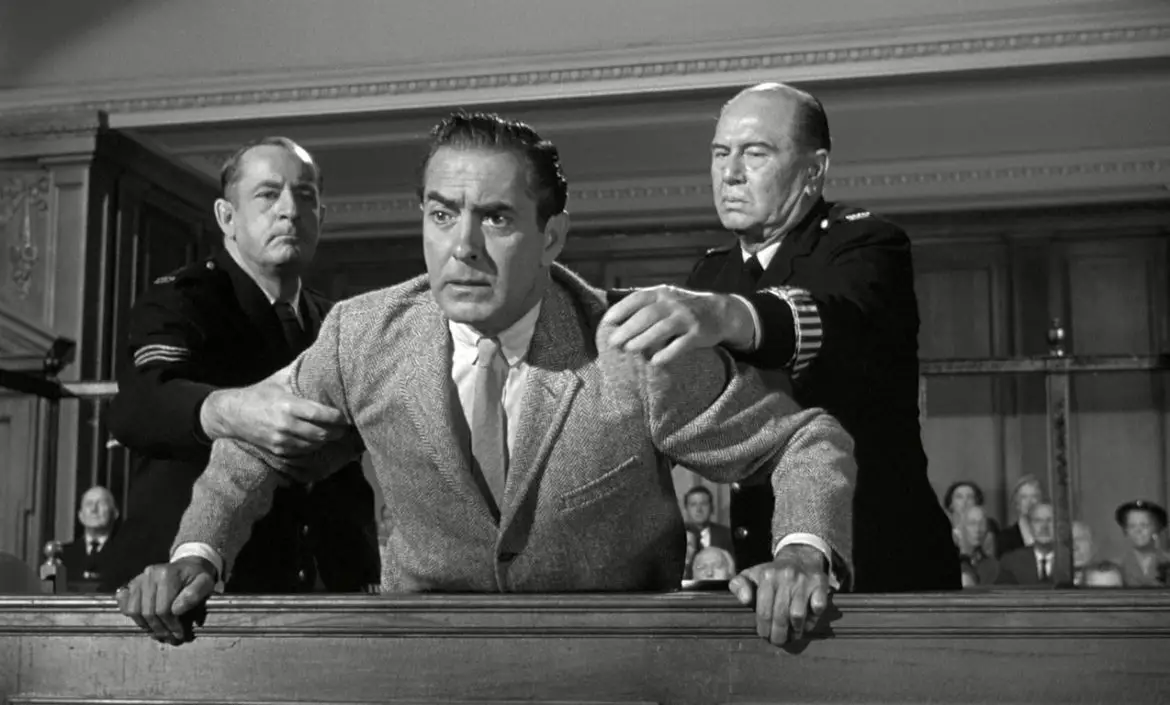
The Oscar-nominated and Billy Wilder-directed Witness for the Prosecution is one of the best courtroom dramas in cinematic history.
Let’s discuss the ending first. The film concludes with the following voiceover narration:
“The management of this theater suggests that, for the greater entertainment of your friends who have not yet seen the picture, you will not divulge to anyone the secret of the ending of Witness for the Prosecution.”
For this reason, I certainly will not divulge the film’s ending. It also wouldn’t be fair to first-time viewers. Not even the actors got their pages for the scenes until it was time to shoot the scene on set. That’s right up there with Marvel and Star Wars secrecy! This is the beauty of dramas such as this one. It is the kind of film which gets people talking. I mean, can you imagine social media in 1957?!? It’s like the major Marvel and Star Wars films–no doubt that people will certainly talk about them. The season two finale of The Mandalorian is a great example. But how many people will have no disregard for those who have yet to see the film? I think it’s genius on the film’s part even if it ultimately screwed one of the film’s stars out of an Oscar nomination.
The gist of the film sees Sir Wilfrid Robarts (Charles Laughton in a commanding performance), a senior barrister, taking on Leonard Vole’s (Tyrone Power) case. He’s doing so against the advice of doctors and his own private nurse, Miss Plimsoll (Elsa Lancaster, Laughton’s wife). Sir Robarts believes Vole is innocent and that he did not kill Mrs. Emily French. Everything rests on the testimony from Vole’s wife, Christine (Marlene Dietrich). Will it be enough to let him off or will he be convicted of murder? And again, because of the studio’s request, I’m not going to say what happens.
As a filmmaker, Billy Wilder was in his prime during the 1950s and made some of the best films of his career. His direction of the film led to the film earning a number of Oscar nominations including Best Picture, Billy Wilder (Best Director), Charles Laughton (Best Actor), and Elsa Lancaster (Best Supporting Actress). Other nominations went to the film for editing and sound recording. But because of the film’s campaign at the time, Marlene Dietrich lost out on any chance of being nominated. She’s quite brilliant in the film to say the least. Dietrich would only take the part if Wilder directed the film, which Arthur Hornblow Jr. was producing for United Artists. The rest is history.
Kino Lorber Studio Classics released the film on Blu-ray in 2014. Among the limited bonus features is a brief interview with filmmaker Billy Wilder. Wilder discusses the writing of both Raymond Chandler and Agatha Christie:
“If Chandler only had some feeling for construction, he would be unbeatable. He had great style. But for description, not dramatization. Agatha Christie constructed like an angel, full of surprises, but her writing was flat. No dialogue, no human elements. Well, I took the play Witness for the Prosecution…The difference between the play and the movie is in these things we added. Firstly, from a dramatic point of view, I had a great opportunity because I had Laughton and he was dynamite. Secondly, in the play, the character had no heart problem. We added that. Third, there was no nurse–No cigars and no cognac.”
Wilder told Volker Schlöndorff about the sets and how they built the Euston station in a small studio. They also discuss the third act and how the hero/heroine have the noble choice. Dietrich’s character has to make a noble choice. Going into the final minutes, as Wilder notes, the people also are on her side. Does she make the noble choice? I won’t say what the choice that she makes is because of spoilers. Even in a film over 60 years old, we certainly have to keep some secrets before audiences can watch.
I have to give a lot of credit to production designer Alexander Trauner. He didn’t have the necessary access required to take photos at the Old Bailey so his work was cut out for him. The sets for both the Old Baily and Wilfrid’s quarters at the Inns of Court are so realistic that you can hardy believe the detail that went into the work. Personally speaking, production designers don’t get enough credit for their work.
Unfortunately, the film also serves as Tyrone Power’s final completed movie. He died of a heart attack in 1958 at the age of 44 years old. Producers Edward Small and Arthur Hornblow Jr. were all in on Power from the start. However, Wilder had wanted his Ace in the Hole star Kirk Douglas for the role. This plan, however, didn’t really go anywhere. Roger Moore’s name came up in conversation during the time in which it seemed Power would have been a no-go.
One quick note about Agatha Christie: there is no shortage of antisemitism on display in her work. The ADL penned a letter to Christie and even though she probably didn’t see it, her agent gave U.S. publishers permission to remove the offensive references about both Jews and Catholics from pre-World War II novels. These references were kept in England at the time. Is this what went for the era? Sure–but it doesn’t make it any less offensive or antisemitic.
Bonus Features
- Billy Wilder discussing WITNESS FOR THE PROSECUTION with director Volker Schlöndorff. In German and English with English Subtitles
- Original Theatrical Trailer
DIRECTOR: Billy Wilder
SCREENWRITERS: Billy Wilder and Harry Kurnitz
CAST: Tyrone Power, Marlene Dietrich, Charles Laughton, with Elsa Lancaster, John Williams



